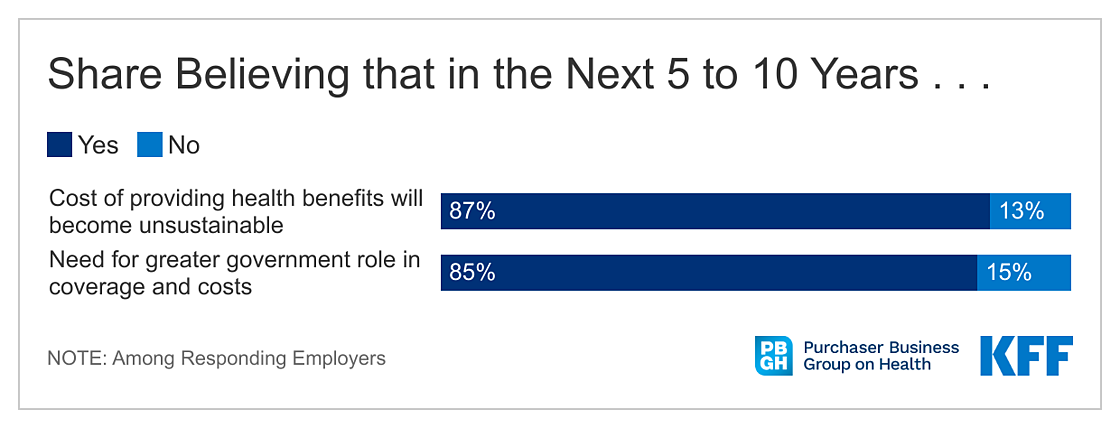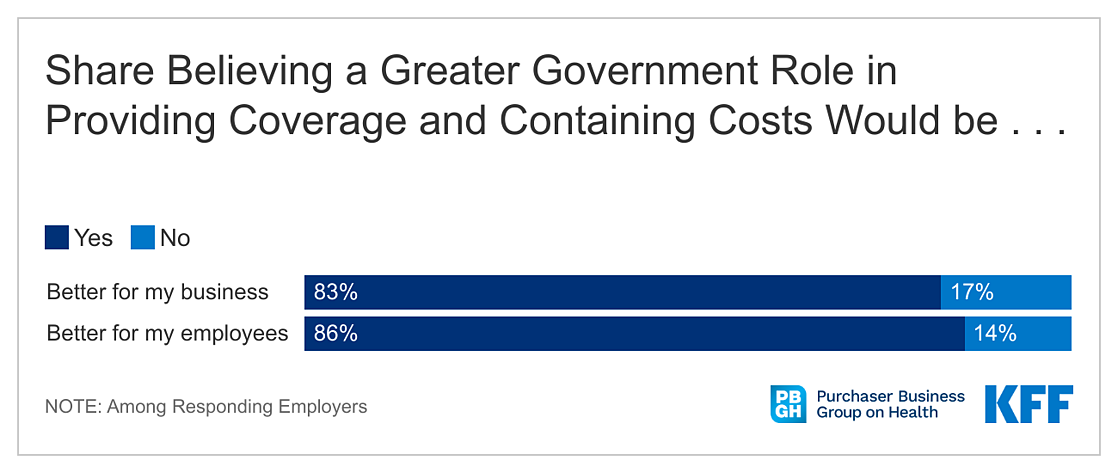
The independent source for health policy research, polling, and news.
Vast Majority of Large Employers Surveyed Say Broader Government Role Will Be Necessary to Control Health Costs and Provide Coverage, Survey Finds
Most Business Leaders Favor Increased Anti-Trust Enforcement, Prohibitions on Anti-Competitive Practices, Capping Drug and Hospital Prices in Non-Competitive Markets; A Public Option and Lower Medicare Eligibility Age Seen as Viable Options
Top executives at nearly 90% of large employers surveyed believe the cost of providing health benefits to employees will become unsustainable in the next five-to-10 years, and 85% expect the government will be required to intervene to provide coverage and contain costs, according to a new survey released today from Purchaser Business Group on Health (PBGH) and KFF (Kaiser Family Foundation), with support from the West Health Institute.
The research exposes large employers’ mounting concerns about the future of employer-sponsored coverage, with 87% of respondents saying they believe that the cost of providing health benefits to employees will become unsustainable in the next five to 10 years.
More than 300 executive decisionmakers at companies with over 5,000 employees responded to the survey in December 2020 and January 2021. The survey report was released today in advance of a web briefing jointly held by PBGH and KFF examining the views of business leaders on health policy.
“This survey highlights what we’ve understood for some time: The current health care system is on an unsustainable path,” said Elizabeth Mitchell, President and Chief Executive Officer of PBGH. “Our large employer members support competition and prefer market solutions. But they have reached their limit; they’re tired of pouring tons of money into a broken health care market that delivers uneven quality at bloated costs.”
Annual family premiums for employer-sponsored health insurance reached $21,342 in 2020, up 55% since 2010 and increased at a rate at least twice that of both wages (27%) and inflation (19%). During the same period, the average single employee deductible increased from $917 to $1,644 among workers with a deductible.
Employer health plans are already paying much higher prices for health care goods and services than public plans: Hospitals across the country charge employers and private insurance companies an average of 2.5 times what they get from Medicare for the same care, and three or more times Medicare prices in a half-dozen states.
“Any efforts to expand public coverage options or restrain prices will be met with strong opposition from the health care industry,” said Larry Levitt, Executive Vice President for Health Policy at KFF and an author of the report. “Employers, who foot much of the nation’s health care bill, could be a powerful counterweight.”
“Skyrocketing health care costs pose a significant threat to the prosperity of business and American workers. Every extra dollar spent on health care is one less dollar available for wages, investments and other essential business expenses,” said Shelley Lyford, President and Chief Executive Officer for West Health.
“Employers are getting a raw deal and they need to leverage their collective power in Washington to inspire action from lawmakers – particularly at a time when the economy is reeling from a pandemic.”
Among the central takeaways from the PBGH-KFF-West Health Survey:
Four-in-five respondents (87%) believe the cost of providing health benefits will become unsustainable in the next five to 10 years.
85% of respondents said the government will be required to play a greater role in providing health care coverage and containing costs in the next five-to-10 years; 83% said such actions would be better for their business and 86% said these actions would be better for their employees.
92% of respondents believe policymakers should pursue policies that would strengthen anti-trust enforcement and prohibit anti-competitive conduct by providers, pharmaceutical manufacturers and health plans; 90% would support actions that improved the transparency of prices and the total cost of care.
More than one-third of respondents somewhat or strongly agreed with government policies that would cap prices for hospitals in markets with limited or no competition; limit prices charged by out-of-network providers; and negotiate prices for high-cost, sole-source drugs or set limits on drug price increases.
Relatively few respondents generally disagreed with proposals that would lower the age of Medicare eligibility to age 60 or create a new public plan coverage option, either for their own employees or the general public. This lack of disagreement may reflect the absence of detail about how these options ultimately could play out, but employers nonetheless appear open to extending public coverage options to more individuals, including their own employees.
Mitchell of PBGH concluded: “Clearly, a consensus has emerged among those who foot the bills that the health care industry is not taking seriously enough the impact of rising costs that fail to correlate with higher quality health care.”
The KFF-PBGH survey was conducted between December 2020 and January 2021 by Beresford Research in partnership with the Gary and Mary West Health Institute (West Health). The telephone survey was designed by researchers at KFF, PBGH and Beresford Research, and relied on convenience sample of opinion from representatives of 302 employers with at least 5,000 employees. The responding organizations were widely distributed by region and industry. Individual respondents included chief executive officers, chief operational officers, chief human resource officers, or individuals directly reporting to these positions. Follow-up conversations were conducted with 10 of the respondents to gain additional information and insight.
About Purchaser Business Group on Health. PBGH is a nonprofit coalition representing nearly 40 private employers and public entities across the U.S. that collectively spend $100 billion annually purchasing health care services for more than 15 million Americans and their families. In partnership with large employers and other health care purchasers, PBGH initiatives are designed to test innovative operational programs and scale successful approaches that lower health care costs and increase quality across the U.S.
About KFF. Filling the need for trusted information on national health issues, KFF (Kaiser Family Foundation) is a nonprofit organization based in San Francisco, California.
About West Health. Solely funded by philanthropists Gary and Mary West, West Health is a family of nonprofit and nonpartisan organizations including the Gary and Mary West Foundation and Gary and Mary West Health Institute in San Diego, and the Gary and Mary West Health Policy Center in Washington, D.C. West Health is dedicated to lowering healthcare costs to enable seniors to successfully age in place with access to high-quality, affordable health and support services that preserve and protect their dignity, quality of life and independence. Learn more at westhealth.org and follow @westhealth.


